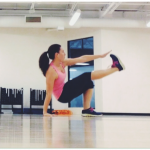Whenever I am feeling down, I can always guarantee that going for a run, horseback riding, hiking with friends, or teaching a group exercise class will instantly lift my mood. Can a few minutes on the treadmill make your emotional problems disappear? Most likely not. However, a regular exercise routine can certainly decrease depression, enhance mood, and result in many other health benefits. Getting active can potentially be the key to living a happier life!
For someone dealing with depression or anxiety, exercise may often be the last thing he or she wants to do. Simply taking medication may seem easier than getting into the gym. However, some studies have shown that the benefits of exercise continue to last longer than the benefits of anti-depressants. Perhaps one of the greatest outcomes of exercise is the way it naturally makes you feel. Exercise has proven to be a very effective, but often neglected, method of treating mild to moderate depression. Why is this?
When you exercise, your body produces chemicals called endorphins, which trigger positive feelings in the body. They also act as analgesics, which diminish the perception of pain, improve immunity, and prevent depression from worsening. Exercising also increases body temperature, which may have calming effects on the individual. Other psychological benefits of exercise may include the following:
 Increased self-esteem and confidence
Increased self-esteem and confidence- Reduced stress
- Distraction from worries or negative thoughts
- Improved sleep
- Coping in a healthy way (instead of turning to drugs, alcohol, binge eating, etc.)
As if that wasn’t enough convincing, exercise can also result in the following health benefits:
- Strengthen heart and lungs
- Strengthen and build bones
- Improve blood sugar levels (treat diabetes)
- Increase energy levels
- Increase muscular strength and endurance
- Reduce blood pressure
- Reduce cholesterol
- Reduce body fat
If you are someone who struggles with enjoying exercise, you don’t necessarily need to limit yourself to hours in the gym! Consider other methods of physical activity  such as walking or biking outside, playing tennis with friends, yard work at your home, swimming in the pool, etc. Also, since social support is important for those with depression, participating in group exercise classes or working out with a friend or partner may be beneficial. Check out your local gym for class schedules and group training options or make plans with a friend to get together for workouts.
such as walking or biking outside, playing tennis with friends, yard work at your home, swimming in the pool, etc. Also, since social support is important for those with depression, participating in group exercise classes or working out with a friend or partner may be beneficial. Check out your local gym for class schedules and group training options or make plans with a friend to get together for workouts.
If you can create the time, get past the sweat (and sometimes soreness) and make exercise a part of your weekly routine, you will find yourself smiling much more often!
What will you do to release some endorphins today? Share your comments below!

1 Comment
Depressed people are growing in numbers. Let's exercises for endorphins!